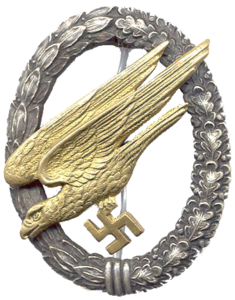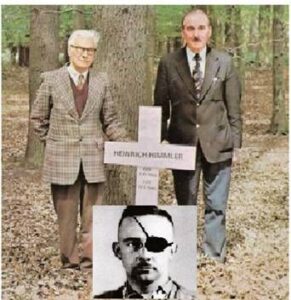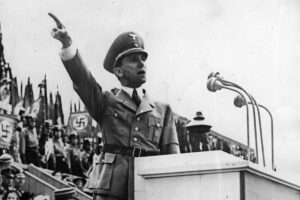Scheel, Gustav Adolf, born 21-11-1907 in Rosenberg (Baden),  Grand Duchy of Baden, German Empire, as a Protestant pastor’s son. Scheel attended classical gymnasium schools in Freiburg, Tauberbischofsheim and Mannheim. While still a schoolboy, he became involved in nationalist circles of the German Youth Movement and Nazi groups.
Grand Duchy of Baden, German Empire, as a Protestant pastor’s son. Scheel attended classical gymnasium schools in Freiburg, Tauberbischofsheim and Mannheim. While still a schoolboy, he became involved in nationalist circles of the German Youth Movement and Nazi groups.  Beginning in the summer semester of 1928, he studied law, political economy and theology at Heidelberg University
Beginning in the summer semester of 1928, he studied law, political economy and theology at Heidelberg University  to become a minister like his father. Scheel intensified his activities in right-wing student circles and in the winter semester of 1928-29 became a member of the Verein Deutscher Studenten (VDSt),
to become a minister like his father. Scheel intensified his activities in right-wing student circles and in the winter semester of 1928-29 became a member of the Verein Deutscher Studenten (VDSt),  an umbrella organization of German Studentenverbindung fraternities. In 1928 he also joined the Heidelberg German Student Union (Deutschen Studentenschaft, DStA). In October 1931 he was named to the board of directors and in December 1931 he became its chairman.
an umbrella organization of German Studentenverbindung fraternities. In 1928 he also joined the Heidelberg German Student Union (Deutschen Studentenschaft, DStA). In October 1931 he was named to the board of directors and in December 1931 he became its chairman.
In April 1938, Scheel became an active Senator of Heidelberg University, and he was also elected to the Reichstag from electoral constituency 20, Cologne- Aachen, retaining this seat until May 1945. In May 1938, he became leader of the National Socialist Alumni Association and also served as editor of its official organ, Der Altherrenbund.  That same month he was made Chairman of the Reichsstudentenwerk (Reich Student Union). In November 1940, he was named an honorary Senator of Julius Maximilian University of Würzburg.
That same month he was made Chairman of the Reichsstudentenwerk (Reich Student Union). In November 1940, he was named an honorary Senator of Julius Maximilian University of Würzburg.
In 1943, he declared in his capacity as Reich Student Leader that the members of the White Rose (Weiße Rose) resistance group of Hans Fritz and Sophie Magdalena Scholl 
 should be “executed not as students,” but rather as “antisocial former Wehrmacht members.” Scheel’s point of view was that these “criminals” should not be allowed to stain the student body’s image. From this time also came Scheel’s declaration: “German student, it is not necessary for you to live, but, to be sure, to fulfill your duty to your people.” In 1943, Scheel became President of the German Academic Exchange Service and in June 1944, he succeeded Walter Schultze
should be “executed not as students,” but rather as “antisocial former Wehrmacht members.” Scheel’s point of view was that these “criminals” should not be allowed to stain the student body’s image. From this time also came Scheel’s declaration: “German student, it is not necessary for you to live, but, to be sure, to fulfill your duty to your people.” In 1943, Scheel became President of the German Academic Exchange Service and in June 1944, he succeeded Walter Schultze  as leader of the National Socialist German Lecturers League. Schultze was also involved in the T-4 Euthanasia Program. At least 380 cases of aiding and abetting the killing of disabled people were traced to him. In 1960, he was sentenced to four years’ imprisonment. Schultze died on 16-08-1979, age 85, in Krailling, near Munich.
as leader of the National Socialist German Lecturers League. Schultze was also involved in the T-4 Euthanasia Program. At least 380 cases of aiding and abetting the killing of disabled people were traced to him. In 1960, he was sentenced to four years’ imprisonment. Schultze died on 16-08-1979, age 85, in Krailling, near Munich.
On 30-07-1934 Scheel was accepted into the Sicherheitsdienst (SD), the Nazi Party security service by its head, SS Obergruppenführer and Head of RSHA. Reichssicherheitshauptamt. Reinhard Heydrich.  He left the SA and joined the Schutzstaffel (SS) on 15-09-1934 and became a full time SD employee in the SD Main Office. He rose swiftly in this secret Nazi intelligence service. Between September 1934 and August 1935 he headed the SD training school in Berlin. Between August 1935 and September 1939 he was Leader of the SD Oberabschnitt (Upper District) Southwest, headquartered in Stuttgart.
He left the SA and joined the Schutzstaffel (SS) on 15-09-1934 and became a full time SD employee in the SD Main Office. He rose swiftly in this secret Nazi intelligence service. Between September 1934 and August 1935 he headed the SD training school in Berlin. Between August 1935 and September 1939 he was Leader of the SD Oberabschnitt (Upper District) Southwest, headquartered in Stuttgart.
As a former student official, he brought along with him to the SD a great many young Nazi academics who went on to become mass murderers. Among them were SS-Brigadeführer Walter Stahlecker,  SS-Standartenführer Martin Sandberger,
SS-Standartenführer Martin Sandberger,  SS-Standartenfuhrer Dr. Erwin Weinmann,
SS-Standartenfuhrer Dr. Erwin Weinmann,  SS Standartenführer Albert Christiaan Rapp,
SS Standartenführer Albert Christiaan Rapp,  SS Oberführer Erich Ehrlinger,
SS Oberführer Erich Ehrlinger,  and Eugen Carl Steimle,
and Eugen Carl Steimle, 
 all of whom went into various divisions of the Reichssicherheitshauptamt (RSHA) to become leaders of murder squads of the various Einsatzgruppen. Stahlecker as fatally wounded in action on 22-03-1942, age 41, by Soviet partisans near Krasnogvardeysk, Russia. Sandberger after a sentenced to death his sentence was subsequently commuted to life imprisonment. Involvement of among others his father – retired director of IG Farben, resulted in a lobby for clemency in 1958. He died on 30-03-2010 at the age of 98 in a nursing home. Weinmann was never captured and probably escaped to the Middle East.and on 09-06-1949 declared dead. On 18-09-1975, age 66, Albert Rapp died in prison. Erich Ehrlinger was finally arrested in December 1958. Ehrlinger was convicted in a 1961 trial in connection with 1,045 cases of murder and was sentenced to 12 years imprisonment. The case was appealed and eventually returned to the public prosecutor’s office. His sentence was officially remitted in 1969, four years after he was released from prison. Ehrlinger died 31-07-2004 (aged 93) in Karlsruhe, Baden-Württemberg, Germany.
all of whom went into various divisions of the Reichssicherheitshauptamt (RSHA) to become leaders of murder squads of the various Einsatzgruppen. Stahlecker as fatally wounded in action on 22-03-1942, age 41, by Soviet partisans near Krasnogvardeysk, Russia. Sandberger after a sentenced to death his sentence was subsequently commuted to life imprisonment. Involvement of among others his father – retired director of IG Farben, resulted in a lobby for clemency in 1958. He died on 30-03-2010 at the age of 98 in a nursing home. Weinmann was never captured and probably escaped to the Middle East.and on 09-06-1949 declared dead. On 18-09-1975, age 66, Albert Rapp died in prison. Erich Ehrlinger was finally arrested in December 1958. Ehrlinger was convicted in a 1961 trial in connection with 1,045 cases of murder and was sentenced to 12 years imprisonment. The case was appealed and eventually returned to the public prosecutor’s office. His sentence was officially remitted in 1969, four years after he was released from prison. Ehrlinger died 31-07-2004 (aged 93) in Karlsruhe, Baden-Württemberg, Germany.
Promoted to SS-Oberführer,  Scheel on 25-04-1938 became Inspector for the Sicherheitspolizei (Security Police, SiPo)
Scheel on 25-04-1938 became Inspector for the Sicherheitspolizei (Security Police, SiPo)  and Sicherheitsdienst (Security Service, SD) in Wehrkreis (Military District) V (Baden and Württemberg), based in Stuttgart. He then transferred to become Leader of SD Oberabschnitt South in Munich from 18-06-1939. On 06-12-1939, he became the Inspector for SiPo and SD in Wehrkreis VII (Munich) and XIII (Nuremberg) encompassing all of Bavaria.
and Sicherheitsdienst (Security Service, SD) in Wehrkreis (Military District) V (Baden and Württemberg), based in Stuttgart. He then transferred to become Leader of SD Oberabschnitt South in Munich from 18-06-1939. On 06-12-1939, he became the Inspector for SiPo and SD in Wehrkreis VII (Munich) and XIII (Nuremberg) encompassing all of Bavaria.
Scheel, in the spring of 1940 performed military service as a medical officer with the rank of Unterarzt, serving with the Luftwaffe  in the battle of France. After the fall of France, from May through July 1940, Scheel headed Einsatzgruppe III in Alsace and was involved in the deportation of Jews from that area. From August 1940 to January 1941 he was Befehlshaber der Sicherheitspolizei und des SD (Commander of the SiPo and SD) attached to the office of the Chief of Civil Administration in Alsace, Gauleiter of Baden and later of Baden-Alsace Robert Heinrich Wagner.
in the battle of France. After the fall of France, from May through July 1940, Scheel headed Einsatzgruppe III in Alsace and was involved in the deportation of Jews from that area. From August 1940 to January 1941 he was Befehlshaber der Sicherheitspolizei und des SD (Commander of the SiPo and SD) attached to the office of the Chief of Civil Administration in Alsace, Gauleiter of Baden and later of Baden-Alsace Robert Heinrich Wagner.  In October 1940, Scheel organised the deportation of Karlsruhe’s Jews to their certain deaths in the east.
In October 1940, Scheel organised the deportation of Karlsruhe’s Jews to their certain deaths in the east.  Nine of the defendants in the trial for the Beer Hall Putsch, also known as the Munich Putsch, was a failed coup d’état by Nazi Party leader Adolf Hitler, Erich Ludendorff
Nine of the defendants in the trial for the Beer Hall Putsch, also known as the Munich Putsch, was a failed coup d’état by Nazi Party leader Adolf Hitler, Erich Ludendorff  and other Kampfbund leaders in Munich, Bavaria, on 8–9 November 1923, during the period of the Weimar Republic, on 01-04-1924. Robert Wagner on the far right. On 29-04-1945 Robert Heinrich Wagner went into hiding as a farmhand near Tuttlingen. He finally turned himself in to the American troops in Stuttgart on 29-07-1945, who handed him over to the French authorities in early 1946. Wagner was tried and sentenced to death by the Permanent Military Tribunal in Strasbourg from 23 April to 3 May 1946. The sentence was carried out by a firing squad on 14-08-1946. Wagner, age 50, remained a loyal Nazi until the end, as is evident from his last words before the execution: “Long live Greater Germany, long live Adolf Hitler, long live National Socialism.”
and other Kampfbund leaders in Munich, Bavaria, on 8–9 November 1923, during the period of the Weimar Republic, on 01-04-1924. Robert Wagner on the far right. On 29-04-1945 Robert Heinrich Wagner went into hiding as a farmhand near Tuttlingen. He finally turned himself in to the American troops in Stuttgart on 29-07-1945, who handed him over to the French authorities in early 1946. Wagner was tried and sentenced to death by the Permanent Military Tribunal in Strasbourg from 23 April to 3 May 1946. The sentence was carried out by a firing squad on 14-08-1946. Wagner, age 50, remained a loyal Nazi until the end, as is evident from his last words before the execution: “Long live Greater Germany, long live Adolf Hitler, long live National Socialism.”
Scheel’s further rise within the Nazi repression apparatus continued unabated. In April 1941, he rose to the rank of SS-Brigadeführer.  He became the Higher SS and Police Leader (HSSP) Alpenland from 01-05-1941 while also commanding SS Oberabschnitt Alpenland. In this post, he was the commander of all SS and police forces, including the Ordnungspolizei (Order Police) in the four Reichsgaue of Wehrkreis XVIII, Carinthia, Salzburg, Styria and Tirol-Vorarlberg and reported directly to Heinrich Himmler.
He became the Higher SS and Police Leader (HSSP) Alpenland from 01-05-1941 while also commanding SS Oberabschnitt Alpenland. In this post, he was the commander of all SS and police forces, including the Ordnungspolizei (Order Police) in the four Reichsgaue of Wehrkreis XVIII, Carinthia, Salzburg, Styria and Tirol-Vorarlberg and reported directly to Heinrich Himmler.  He was made a Major General of Police on 19-10-1941. Scheel left the SD service on 24-11-1941 and was transferred to the staff of the Reichsführer-SS. He was promoted to SS-Gruppenführer
He was made a Major General of Police on 19-10-1941. Scheel left the SD service on 24-11-1941 and was transferred to the staff of the Reichsführer-SS. He was promoted to SS-Gruppenführer  on 21-06-1942, SS-Obergruppenführer
on 21-06-1942, SS-Obergruppenführer  on 01-08-1944 and General of Police on 04-08-1944.
on 01-08-1944 and General of Police on 04-08-1944.
Scheel was named as Gauleiter of Reichsgau Salzburg on 18-11-1941, succeeding Friedrich Rainer.  Formally installed on 27 November, he also that day succeeded Rainer as Reichsstatthalter (Reich Governor) thus uniting under his control the highest party and governmental offices in his jurisdiction. Further, on 11 December he also succeeded Rainer as Reich Defense Commissioner of Wehrkreis XVIII. This entailed responsibility for civil defense and evacuation measures as well as administration of wartime rationing and suppression of black market activity. On 16-11-1942, the jurisdiction of the Reich Defense Commissioners was changed from the Wehrkreiss to the Gau level, and Scheel remained Commissioner for his Reichsgau alone. After the discovery of resistance groups in Salzburg, Scheel organized a widespread wave of arrests and had a number of railwaymen put to death.
Formally installed on 27 November, he also that day succeeded Rainer as Reichsstatthalter (Reich Governor) thus uniting under his control the highest party and governmental offices in his jurisdiction. Further, on 11 December he also succeeded Rainer as Reich Defense Commissioner of Wehrkreis XVIII. This entailed responsibility for civil defense and evacuation measures as well as administration of wartime rationing and suppression of black market activity. On 16-11-1942, the jurisdiction of the Reich Defense Commissioners was changed from the Wehrkreiss to the Gau level, and Scheel remained Commissioner for his Reichsgau alone. After the discovery of resistance groups in Salzburg, Scheel organized a widespread wave of arrests and had a number of railwaymen put to death.
In September 1944 Scheel, as the Reich Defense Commissioner, was made leader of the Volkssturm  in Reichsgau Salzburg. On 29-04-1945, Adolf Hitler, in his political testament, named Scheel Reich Minister of Culture, in the short-lived Joseph Goebbels
in Reichsgau Salzburg. On 29-04-1945, Adolf Hitler, in his political testament, named Scheel Reich Minister of Culture, in the short-lived Joseph Goebbels  cabinet.
cabinet.
After Salzburg’s peaceful surrender to the Americans on 4 May 1945, Scheel fled with his family to Sankt Veit an der Glan and on 14 May was arrested by the US 307th Counterintelligence Corps  and interned. After spending time in many camps and prisons, he was released on 24-12-1947. After once again being interned, he was transferred to Heidelberg to undergo denazification. A local court sentenced him in December 1948 to five years in a labour camp, and classified him as Category I, Hauptschuldiger (literally “main culprit”). He was however released on 24-12-1948 as a result of several testimonies in his defence stating that he had ignored Hitler’s commands to defend the city of Salzburg against the approaching US forces.
and interned. After spending time in many camps and prisons, he was released on 24-12-1947. After once again being interned, he was transferred to Heidelberg to undergo denazification. A local court sentenced him in December 1948 to five years in a labour camp, and classified him as Category I, Hauptschuldiger (literally “main culprit”). He was however released on 24-12-1948 as a result of several testimonies in his defence stating that he had ignored Hitler’s commands to defend the city of Salzburg against the approaching US forces.
Afterwards, he first worked as a night worker at the Port of Hamburg, and as of summer 1949, he was a doctor in a Hamburg hospital, then an assistant doctor at Rautenberg Hospital in Hamburg. After an appeal proceeding in 1952, Scheel was reclassified to Category II as a Belasteter (“incriminated one”). From 1951 to 1953, he belonged, along with other former Nazi leaders such as Hugo Robert “Werner” Naumann,  Gauleiter Karl Kaufmann
Gauleiter Karl Kaufmann  and SS-Obergruppenführer Karl Rudolf Werner Best,
and SS-Obergruppenführer Karl Rudolf Werner Best,  to the neo-Nazi Naumann. Kaufmann was sentenced to one year and two months in prison for his role in the Nazi regime, but was released after a short time for health reasons. Kaufmann died 04-12-1969 age 69 in Hamburg. Werner Best died in Mülheim, North Rhine-Westphalia, on 23-06-1989, age 85.
to the neo-Nazi Naumann. Kaufmann was sentenced to one year and two months in prison for his role in the Nazi regime, but was released after a short time for health reasons. Kaufmann died 04-12-1969 age 69 in Hamburg. Werner Best died in Mülheim, North Rhine-Westphalia, on 23-06-1989, age 85.
Circle that tried to infiltrate the Free Democratic Party, and so was Scheel was arrested in January 1953 by British police. He was handed over to German authorities in Karlsruhe in March and released by them on 17-06-1953. On 03-12- 1954, his trial was dismissed for lack of adequate evidence of wrongdoing. From February 1954 to 8 April 1977, he was the owner of a medical practice in Hamburg.
Death and burial ground of Scheel, Gustav Adolf.





Gustav Scheel passed away on 25-03-1979 (aged 71) in Hamburg and is buried at the Cemetery Ohlsdorf in Hamburg. Fuhlsbüttler Strasse. 756, 22337 Hamburg, Germany.

















Leave a Reply